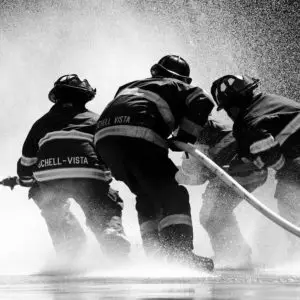The men and women who work as firefighters are some of the bravest people in the country. They put their lives at risk in order to save others from harm’s way. Naturally, this means that their job is a dangerous one and that injuries occur frequently.
Injuries Commonly Reported By Firefighters
The injuries that are the most frequently reported by firefighters include:
Burns
This is the most obvious injury that a firefighter may sustain, after all, they are often running into burning buildings. Burns are broken down into the following degrees:
1st Degree
First degree burns are considered mild and only impacts the outer layer of skin. Patients may experience pain and reddening of the skin.
2nd Degree
When a burn is qualified as a second degree, a patient may present with redness, blistering, swelling, and the skin may look wet or shiny. This is because both the outer layer and an inner layer, the dermis, are damaged. These burns are very painful.
3rd Degree
A third-degree burn damages the full thickness of the skin and goes deeper into underlying tissues. The skin may look charred, appearing black, brown, yellow, or white. Additionally, the burn will not cause pain because the nerve endings will be damaged.
4th Degree
Many people don’t realize that fourth-degree burns exist. At this point, the burn has gone all the way down to the bone. This means the burn is severe enough that the impacted body part must be removed.
Burns are very dangerous and secondary infections are common. If the burns are severe enough, the patient may have to spend months in an intensive care unit.
Lung Injury
Although firefighters should be given protective gear, smoke inhalation does occur and can damage the lungs. Additionally, fire does not discriminate and depending on the location of the blaze, toxic chemicals may go up in flames, chemicals that can damage the lungs if inhaled.
Crush Injury
In addition to the actual flames, one of the biggest dangers when fighting a fire is the potential for a structure to collapse. If caught inside of a building when it collapses, a firefighter may have extreme pressure placed on their body. Even without obvious physical damage, a crush injury can put a firefighter’s life on the line.
A crush injury causes the muscles to die and break down, sending toxins into the bloodstream. These toxins can cause kidney failure, heart arrhythmias, and can cause overall organ failure.
Traumatic Brain Injury
Another injury that can be caused by falling debris is a traumatic brain injury. Brain injuries can be closed or penetrating and can impact a person’s speech, fine motor skills, personality, memory, sense of smell, eyesight, and more. While some patients are able to make a full recovery, others will suffer from symptoms for the rest of their life.
Spinal Injury
Damage to the spinal cord or the vertebrae can cause dizziness, numbness, tingling, burning, and partial or full paralysis. Surgery is frequently required to fix the damage and even with a surgical repair, patients often experience a reduced range of motion.
Firefighters who have been hurt on the job may want to consider obtaining a consultation with a workers’ comp lawyer. A lawyer can help with all of the necessary paperwork, can speak with the insurance companies, and can handle an appeal.
